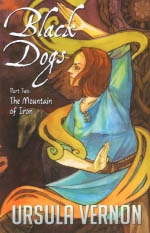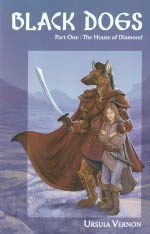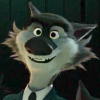Review: Ursula Vernon's 'Black Dogs', vol. 1 & 2

 After the recent review of the terrible Hyenas, here's something to make hyena fans happier!
After the recent review of the terrible Hyenas, here's something to make hyena fans happier!
When Ursula Vernon published the first volume of Black Dogs in 2007, her life was very busy. She was moving house, her webcomic Digger was experiencing a surge in popularity, and her newly-acquired literary agent had got her a sweet deal to write and illustrate children's books for Scholastic.
Understandably, writing a sequel took a back seat, so when the second half of Black Dogs was published four years later, Sofawolf Press conveniently reprinted the first volume with a new cover.
Black Dogs is a fantasy novel set in a world with humans, elves, and many anthropomorphic species. The main character is Lyra, a young human who finds herself on the run after her merchant family's home is attacked by bandits. Though educated and well-read, she hasn't much practical knowledge. Luckily she meets Sadrao, a tall, kind dog-soldier, one of a respected species of anthro-hyenas. Taking her under his wing, she joins him on his travels while he teaches her survival skills.
Sadrao is on an intelligence-gathering mission to determine the machinations of the evil sorceror Vade, whose hostility against the elves bordering on his territory is increasing. Soon, Lyra and Sadrao meet up with two female elf warriors who are on a related mission: Vade's half-elf son, Trent, has escaped his father's control and could prove a valuable asset, except some of Vade's magic may be hiding inside of him. The two groups join together to travel to the archmage of the House of Diamond, who may be able to discover more information.
In the second volume, the group returns to an elven nation on the brink of war, picking up more characters along the way – some anthropomorphic. Not to give the story away, but the war is the least of their problems; Trent and Lyra have to deal with the potent Vade himself.
Black Dogs is a work of traditional fantasy; an entertaining read with some nice touches. In the first volume, the dynamic between Sadrao and Lyra drives the story – bolstered by the other characters, each distinctive in their own way. Lyra manages to learn something from everyone, and her self-doubt gradually drops away as she experiences the wider world and acquires new skills. In particular, Lyra discovers she's a Kythar – a person who can summon spirits through a series of movements and perform magic – although its availability as a power is somewhat fickle.
Before reading the second volume, my biggest worry was that it would feel hastily-written, but this is not the case. I also wish I hadn't heard Ursula speak at a convention. Now whenever I read Lyra's dialogue, my brain overlays it with her voice! Still, Lyra is definitely no Mary Sue.
The pace in the second volume is far more dramatic, with many changes in venue from one fantasy locale to another. Lyra is much more confident and self-empowered in this book. Her Kythar abilities have advanced surprisingly quickly for a beginner, but for the purposes of the narrative I understand why this was done. The main dynamic switches to Lyra's interactions with Trent. As an unfortunate consequence, Sadrao's role is much reduced, which is sad because he's one of the characters that made the previous volume so interesting.
I had to remind myself that Black Dogs, is, first and foremost, Lyra's story. It's still a work of anthropomorphic fiction set in a furry story universe, even if many of the people in the main group are humans or elves. Among the anthros that join them, there's a second dog-soldier (seen in part one) who simply tags along for the rest of the story. I wish that untapped potential for a significant role had been developed further. Perhaps Vernon's concept of the character changed between writing the two books.
Although I slightly prefer the first volume to the second, the latter succeeds in making Vade a very believable adversary. His actions are extremely pragmatic and rational – part of what makes him so scary – and it's made worse by the fact that he's a sadistic control freak. Another plus is how much Lyra manages to accomplish on her own. She thinks outside the box on several occasions, and uses her Kythar powers in ways that are both creative and very unexpected. Her friendship with Sadrao remains strong and she's inherited his many strengths. Most of all, she matures as an individual and finds her place in the world. The end of the book gives closure and there are open opportunities for future adventures.
I hope Vernon continues to write! I'd like to find out more about the dog-soldiers' culture. Overall rating: Good – If you have the chance, check it out!

Comments
I'll be sure to do so. Thanks for the review.
Black Dogs may have been published in book form by Sofawolf Press in 2007 and 2011, but Ursula Vernon posted the complete novel in serial form on the Elfwood fiction website during 2004 and 2005. So it didn't take her four years after 2007 to write the second half. I agree that it is an excellent novel, well worth reading.
http://elfwood.lysator.liu.se/libr/u/r/ursula3/blackdog1.htm.html
Fred Patten
Compared to the general standard of how things work in Fantasy novels, most would have expected the two volumes to be a single novel. And perhaps this is how it will be published in the future if it is ever reprinted. While the first book is self contained enough, it is rather slim compared to the weighty tomes expected from modern fantasy publishing, and the second book pretty much expects you to have read the first one.
My main literary critique would be that a major character is "Chekhov'd" in the sense of obviously being set up far to to be lynch pin of a future event.
However, I do fully recommend the books!
Post new comment